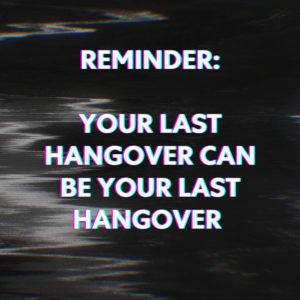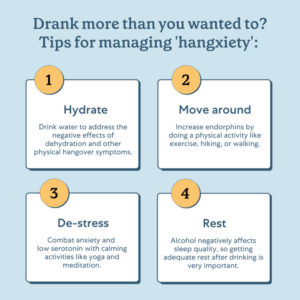The word ‘Hangxiety’ might not be in the dictionary, but you’ve likely heard it and very well may have experienced it. For many, hangover-induced anxiety, or drinking-related anxiety, is very real. Many of my patients pursuing online alcohol treatment at Monument ask me why they feel anxious after drinking alcohol.
What is Hangxiety?
At a very high level, ‘hangxiety’, or ‘hangover anxiety’, is a type of alcohol-related anxiety that occurs after alcohol use. Hangover anxiety occurs for two key reasons:
- Pre-existing anxiety is intensified by alcohol. Anxiety is very commonly co-occurring with alcohol use disorder. People with underlying anxiety disorders may consume alcohol to relieve their anxious feelings, only to find that when the effects of alcohol begin to wear off, their anxiety is even worse than before they started drinking.
- When alcohol ‘wears off’, anxiety sets in. With or without an anxiety disorder, this is a common hangover symptom. Experiencing increased anxiety levels when alcohol wears off makes you want to drink more for relief and can create an unhealthy cycle. Alcohol-induced anxiety can last for a few hours or up to a few days.
Regardless of whether or not you’re diagnosed with baseline anxiety, there is a consistent theme in both of these scenarios: after drinking, we feel anxious, and it may make us want to drink more. (This is also related to why you may feel anxious when you get sober.) This can create a cycle of heavy alcohol use. If you’ve found yourself drinking to soothe negative feelings and uncomfortable hangover symptoms, that’s a sign that you might benefit from support to cut back. Let’s dive into what’s happening in our brain to cause these feelings and what to do to address the root causes of hangxiety.
What Causes Hangixety?
Alcohol is a Depressant
If you’ve ever experienced anxiety after drinking you may have wondered “is alcohol a stimulant or depressant?” To begin to understand hangxiety, we need to remember this fact: When alcohol is consumed, it acts as a depressant. Alcohol consumption results in a sedating effect on the central nervous system. The sedating sensation is a key reason people drink in excess in the first place: to find a way to relax and unwind. While alcohol may provide short-lived relief and calm, alcohol can have depressive effects as it begins to wear off. These effects can lead to other changes in mood and increased anxiety levels. Many people drink more in an effort to relieve or avoid these effects, which can perpetuate unhealthy drinking habits. Moreover, for those who already have an underlying anxiety disorder, alcohol can make medication less effective, compounding the negative effect of alcohol on anxiety. There’s also a link between social anxiety and alcohol use disorder. When socially anxious and shy individuals use alcohol consumption as a coping mechanism, they may end up experiencing even greater levels of anxiety.
Alcohol Affects Dopamine & Serotonin
When people initially consume alcohol, certain neurotransmitters increase in the brain, including serotonin and dopamine. These neurotransmitters are known as “happiness chemicals,” so their initial increase can lead to the desirable short-term effects associated with alcohol. However, with excessive alcohol use over time, normal serotonin and dopamine levels decrease. This decrease in circulating serotonin and dopamine can also lead to feelings of anxiety.
Let’s take a closer look at these neurotransmitters. Dopamine acts on the pleasure centers of the brain. It’s released in the brain after consuming alcohol, which causes a euphoric feeling immediately after drinking. Over time and with continued use, the brain begins to associate drinking alcohol with pleasure. If this association is strong enough, dopamine may be released when even just thinking of alcohol. Then, after drinking, even more dopamine is released. If you’ve wondered, “why do I crave alcohol?” this dopamine interaction is a key driver of cravings.
In addition to dopamine, serotonin also affects our mood. More specifically, decreased levels of serotonin can lead to various mental health conditions, including depression. This is why people with depression often take serotonin reuptake inhibitors (SSRIs) such as Zoloft and Prozac to increase their levels of circulating serotonin. SSRIs can improve mood and resolve depressive symptoms. Because serotonin is a mood stabilizing neurotransmitter, decreased levels can lead to anxiety. While excessive alcohol use can lead to a surge in serotonin, a sharp decline follows. This decline when sobering up contributes to ‘hangxiety.’ Regardless of how often you drink, whether that’s binge drinking, daily drinking, or other types of drinking habits, you’re susceptible to this common serotonin interaction.

Alcohol Affects Natural Endorphin Levels
The same ‘boom and bust’ of dopamine and serotonin that can lead to ‘hangxiety’ also applies to endorphins. The body uses endorphins to manage stress and pain. So, when alcohol is first consumed, and endorphin levels increase, people may feel less stress. This is why alcohol can have a calming effect and is a key reason why many people drink. However, when these endorphin levels become depressed and decrease after blood alcohol levels decrease, the drop-off of endorphins can lead to anxious feelings. The decrease in endorphins not only causes hangxiety, but also makes us feel less equipped to handle the normal stressors of the upcoming day. Work stress, family stress, social anxiety, and other influences can feel even more overwhelming and can make us want to drink even more to seek relief. This is an unhealthy coping cycle that can be broken with the support of online alcohol treatment.
Alcohol-related Dehydration Affects Our Mood
If you’ve experienced thirst, a pounding headache, and dry skin after drinking, you’re likely familiar with alcohol-induced dehydration. Excessive alcohol consumption causes hangover symptoms like dehydration, especially if you didn’t adequately hydrate when drinking. What you may not know is that dehydration and decreased water intake can also affect our mood. Research shows that decreased water intake can negatively affect people’s sleep cycles, positive emotions, calmness, and satisfaction. Thus, decreased water consumption and the resulting dehydration can also contribute to day-after-drinking anxiety. On the other hand, better hydration, glowing skin, more restful sleep, and more energy are among the benefits of sobriety that I get to witness firsthand in my patients.
How to Address Hangxiety
Now that we’ve discussed the ‘why’ behind “hangxiety”, let’s get to the ‘how.’ How does one get rid of hangover related anxiety? The most important thing to remember is that drinking more will not make it better. (In fact, it will make it worse!) When experiencing increased anxiety after drinking, it’s beneficial to:
- Hydrate to address the negative effects of dehydration and other physical hangover symptoms
- Increase endorphins by doing an activity like exercise, hiking, or walking
- Combat stress and low serotonin by seeking calming activities such as meditation, deep breathing, art, or walking. (This can overlap with #2!)
- Rest. Alcohol negatively affects sleep and wake cycles, so getting adequate rest after drinking is very important
- Take action to change your relationship with alcohol
Number five is both the most challenging and most impactful step you can take to address alcohol-related anxiety or “hangxiety.” Outside of the chemical interactions that contribute to anxiety, people often feel worried or regretful after a night of heavy drinking because of what they may have done or said while drinking. Excessive alcohol use affects relationships and all dimensions of overall wellness. If alcohol is negatively impacting your physical self, mental health, or social wellbeing, you are not alone, and you can make a change. At Monument, you can access therapist-moderated online alcohol support groups to discuss your relationship with alcohol and hear how others navigate similar challenges. You can also explore personalized care including medication to stop drinking and online alcohol therapy. In my work on the Monument platform, I meet with patients to discuss how medication can play a role in changing their habits. I also advise on how to safely cut back based on their unique needs, goals, and medical history, including guidance on if they are at risk of withdrawal symptoms.

As you continue on your journey, remember this: There is no shame in having used alcohol to cope with anxious feelings or to ‘feel good.’ If you’ve felt anxious, embarrassed, worried, or regretful, know that so many others have too and you don’t have to continue feeling this way. You deserve relief, and cutting back on alcohol can increase self-esteem, provide a clearer sense of self, and reduce overall anxiety. Seeking information is a meaningful step, and that’s something to be proud of.
